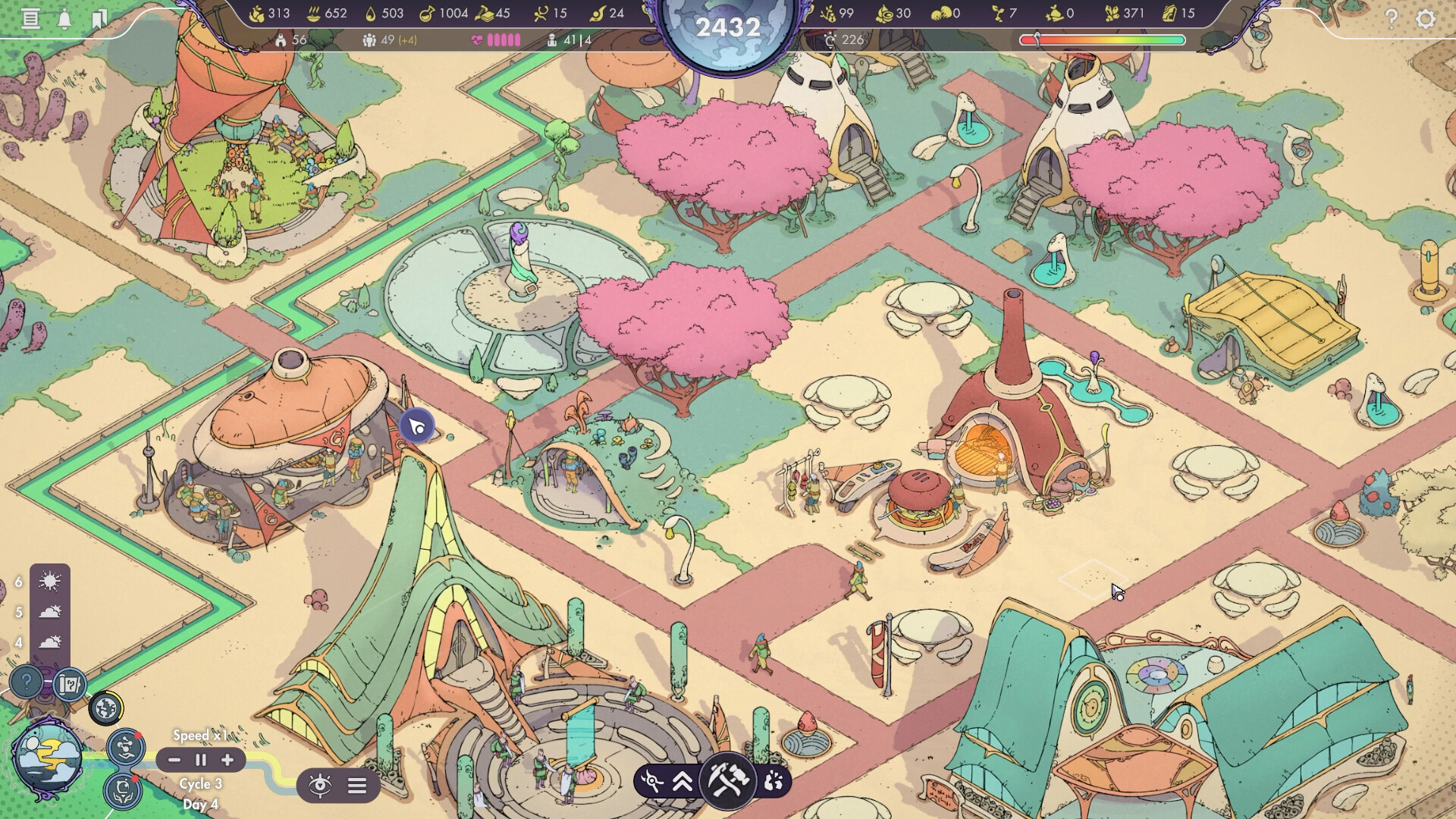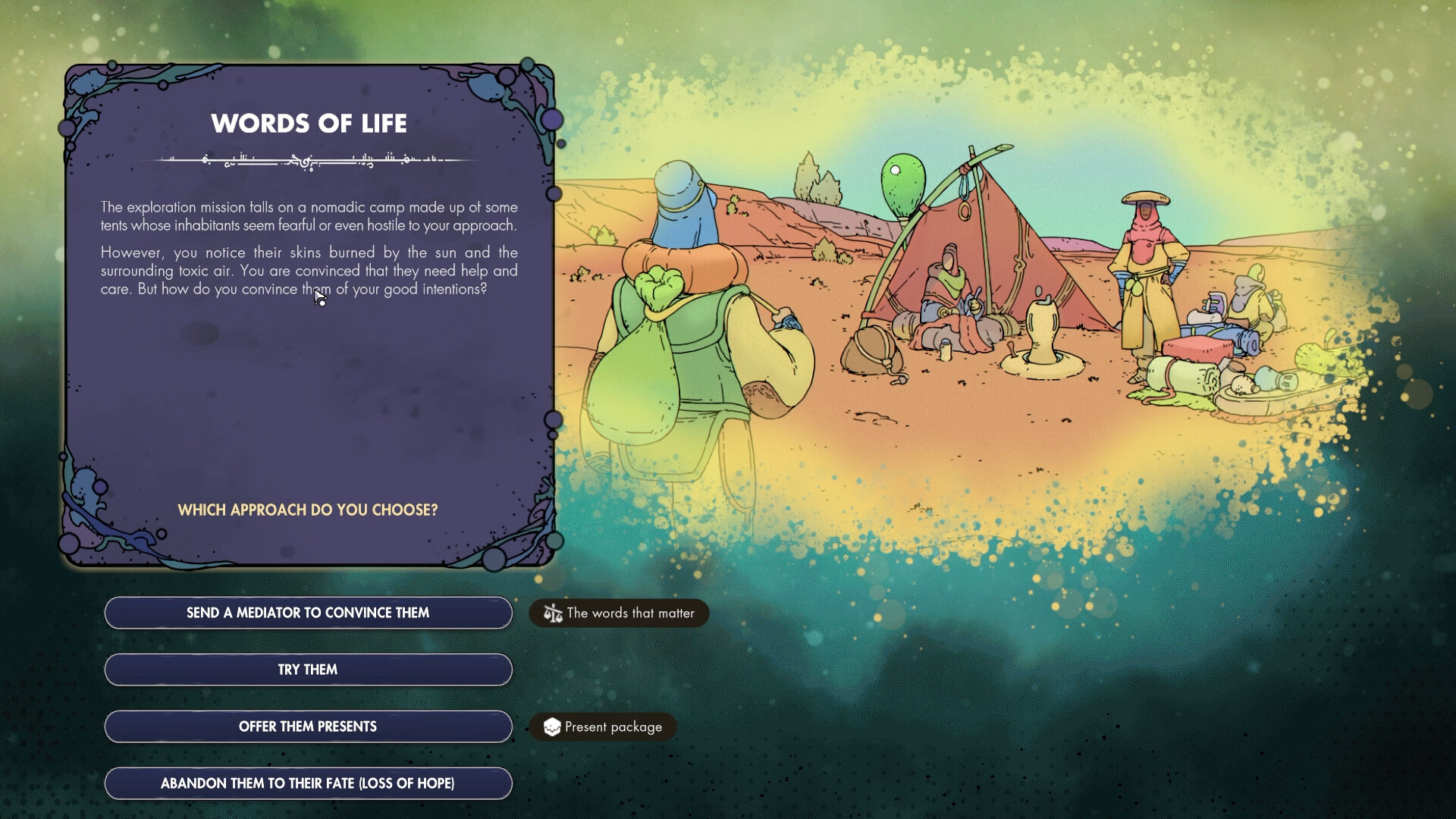Synergy is a post-apocalyptic city-builder. And before we go any further, please leave your preconceptions about that collection of words at the door.
See, we're far enough along in the city-builder resurgence that saying a game in the genre is "post-apocalyptic" conjures images of nuke-blasted landscapes, the player tasked with leading a ragtag group of survivors eking out a grim existence searching for food and warding off mutants.
Synergy--which Riley played a little of earlier in the year when its demo first hit--couldn't be further from that, in presentation or in play. It's a game set on a distant alien world, where humanity has...well, just had a bad run. What was clearly once a highly advanced civilization has fallen into disrepair, and the humans of this world have, over the ages, stopped talking to each other, forgotten how a lot of their old tech works and settled into a more tribal lifestyle. It's clear that things aren't that bad, they're just different.
Your goal is to try to stitch society back together, and Synergy does this through a singleplayer campaign that serves as a kind of long-winded tutorial (there's also a more traditional, sandbox-style city-builder you can play), setting the player a number of challenges they need to meet and weaving that into a story that has you slowly rediscovering the people and landscape of a world that whose horizons have been all but forgotten.
This game rules. I've been playing the Early Access build for a couple of weeks now and just can't put it down. It takes everything I like about city-builders and makes them better, then takes everything I hate about survival city-builders and makes me not hate them.
Structurally this game has a lot in common with Frostpunk, another end-of-the-world city-builder. You need to build a settlement and keep people alive by making sure they're fed and sheltered, and then you need to send some of those people outside the city walls on expeditions into the wild to complete quests. Synergy is different, though, because while I ultimately find the pressures of games like Frostpunk (or even Against The Storm) stressful, this is anything but.
There's an elegance to Synergy's design that's based on the adaptability of your people and the malleability of the world around you. This is a weird, alien place; developers Leikir could have slapped the Scavengers Reign license on this and nobody would have batted an eye. One of the first things you need to do is send scientists out into the field to study the plants around you and find out what exactly is what, because while some are for eating, others can be mined for building materials. Some can be trimmed, leaving them in place and making them a renewable resource, while others will only give up specific bounties if they're pulled out of the ground and lost to you forever.
What you then do with those resources is just as flexible. You need to build a kitchen to make meals out of raw foodstuffs, and these kitchens have a variety of menu options you can cater towards what's available on the current map. Your factories can also output different tools and utilities depending on what's around, or even what's available at that moment if you're waiting for a forest to regrow its berries. And if you need something that can only be had by cutting a tree down, creating a potentially terminal economy? Just build a farm, harvest some seeds and start planting your own.
Synergy thus provides all the flexibility of a management game with little of the stress. Everything, from resource gathering to production lines is a problem to solve, but nothing is ever going to run out or and rarely is it going to someone killed. I never felt stuck or lost like I do when city-builder resources are more finite, or which start starving your citizens at the slightest hint of a particular food supply running short. For a hostile alien world, it's pretty chill! There's still some danger around--your people can get sick from eating the wrong plants, and wounded or even killed on expeditions--but for the most part this is an apocalypse full of possibilities, not impending doom.
Your settlers are hardy and industrious, and so are many of the other humans you meet out in the world. They might be living in the ruins of an old city and want to trade, or need some help getting an old printing press up and running so they can distribute a zine telling people what's safe to eat and what's not. This pioneering spirit matches the pliable nature of the gameplay perfectly; the people can make do with whatever, so it's fine for you to do likewise.

Synergy's city-planning is just as elastic. Every settlement needs the basics first, like water treatment and housing, but after a while you'll need to start creating whole districts that specialise in stuff like culture or science, and the way you place each building within those districts creates a series of overlapping bonuses for every structure within their radius. The whole point of this game is rediscovering the glories of a fallen civilization, so your people don't just want to survive, they want to live in nice houses on nice streets with trees for shade and access to good food, schools, jobs and somewhere to unwind at the end of the day.
In terms of feedback, Synergy's consistent coloured icon system is an intuitive way to keep you informed of what everyone's up to and what each building needs (and may be short on), though in this Early Access build it could do with some refinement; it's quick to tell you that a kitchen is short in ingredients, for example, but actually tracking down those resources in the wild can be a pain, while the reliance on a district system in bigger settlements would be easier to manage if you could move a building instead of being forced to individually disassemble then reconstruct every building you may have placed a square or two out of place.
The RPG-lite quest system is also pretty cool, for what it is. In the singleplayer campaign you need to explore the world around you by attending various points of interest on a world map, and while some are vital storyline missions, most are just random encounters with survivors, natural obstacles, weird aliens or...all three at once. There's not much to them; usually you're just told what's going down and are then given an option on how to tackle them. Sometimes it's an ethical decision, other times you might unlock certain responses because you've built enough gear back in your settlement (some protective equipment would let you explore a toxic swamp, for example, while some tools might let you fix an ancient turbine). The writing in all of them is great though, conjuring up all kinds of weird and wild alien scenarios, and they're all accompanied by big pieces of splash art that are just…
OK, I've made it this long without bringing it up, but let's talk about Synergy's visuals. I could have written a whole post just about how this game looks. It is beautiful. I have often found myself completely neglecting my responsibilities as town custodian just because I'm staring slack-jawed at my little people moving around their gorgeous buildings and doing their little 2D-animation things. The art on quests and story updates is stunning. There's a lot of Moebius here, and as a result some Nausicaa here as well, but I think it's important to stress that those are just influences, conversational starting points. Synergy's look is very much its own, everything from its buildings to its clothing all coming together with wonderful...synergy, and if Leikir had just shipped this as a "watch little guys and don't actually do anything" game I'd still probably have 1500 very nice words to say about it.
As things stand, I've written 1364 words on it, and think I'm about done. This game is great, go play it, and when you look back on 2024 as a very good year for indie city-builders, remember to rank this very close to the top.



